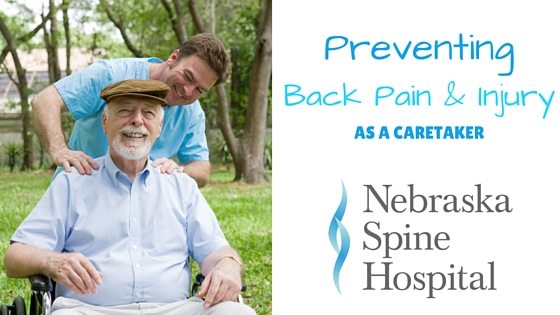If you are the caretaker for someone suffering from chronic pain or illness, you know that it is rewarding and necessary, even if it takes a toll. We know that many of our patients want or need some assistance at home after surgery, and it’s usually a family member who is the one to help. Providing care for the sick or elderly, whether for work or for a family member can put a strain on your mental, emotional and physical health. We’d love to see you take some time to care for yourself, as well! Your back is an important part of your daily routine, especially if you are a caretaker, and there are things you can do to help prevent strain and injury!
In 2009, a survey was given to over 60,000 care takes and the results were astonishing. The study suggested that people in healthcare or private care may sustain physical and mental health issues as a result of their work. Commonly, back pain was a primary health issue. To prevent back pain while on the job you should try the following:
1) Employ proper lifting techniques.
Just like lifting any heavy object, don’t bend at the waist. Use your legs to lift or pull. Try to avoid twisting when carrying a person. Keep the person close to your body. Keep your posture aligned. Always accept help when offered.
2) Consider lifting assistance devices
Walkers and rails are easy to use and install, if needed. Other options are sliding boards, lift sheets or gait belts, which help you move a patient from one place to another safely.
3) Stretch and Strengthen your back
Try things like the “Standing Back Arch” – it includes taking a few, slow deep breaths to help you relax. By exercising and stretching, you can help prevent injury before it happens. The added benefit is that routine exercise is good for your mental health, too!
4) Recognize the signs and symptoms of caregiver burnout.
You might be too busy taking care of others that you don’t even realize you need a little care for yourself. Know your limits and don’t be afraid to ask for help. Don’t be afraid to find someone you trust to talk about your feelings. Most importantly, set some time aside for yourself.
Being a caretaker is both challenging and rewarding. Even if you are a temporary caregiver after a surgery or brief illness, you still need to protect your health. There are times when you may put yourself at risk of injury while on duty. Make sure that you help prevent back pain and injury by employing the techniques above. If you have questions about best practices for preventing back pain as a caregiver, please reach out to one of our Nurse Navigators who can expertly answer all of your questions!

